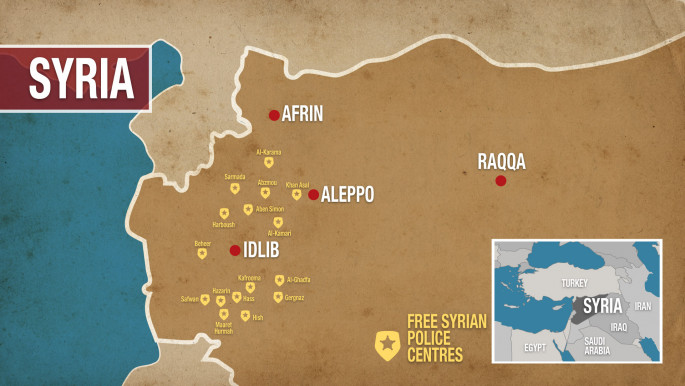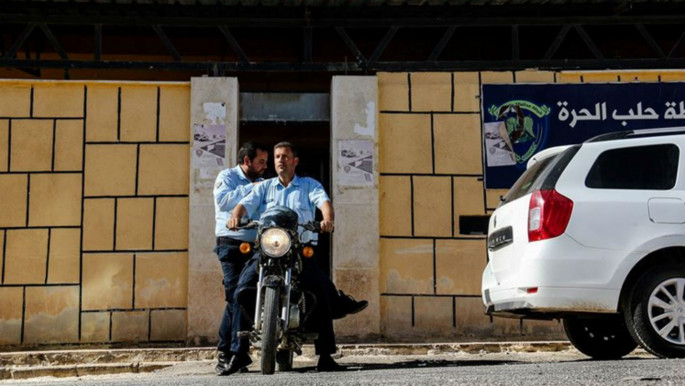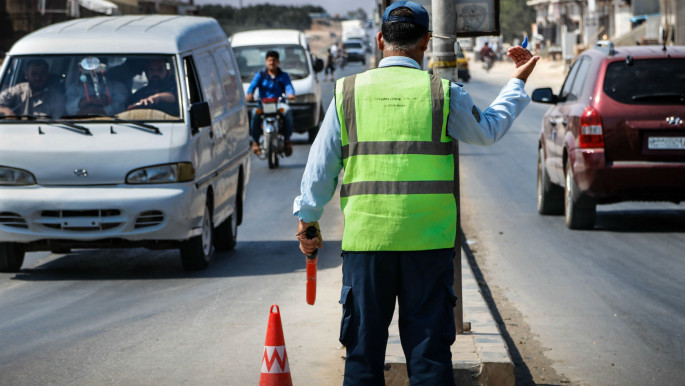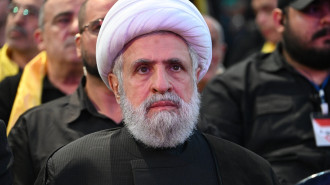In the line of fire: Free Syria's police brace for regime's Idlib offensive
The Free Syrian Police (FSP) have been key to the establishment of law and order in Syria's north over the past six years, preventing outbreaks of looting and lawlessness in opposition territories.
Their pursuit of thieves, as well as their work with the White Helmets, or more ordinary tasks such as directing traffic, have seen their roles as officers transformed since they defected from the regime.
The trust the unarmed officers have earned from the community and ability to maintain order, without brutality, has made them among the most popular institutions operating in opposition areas.
Their ability to halt the spread of extremist groups - such as Tahrir al-Sham (HTS) - has also seen the Free Syrian Police become one of the Syrian opposition's great success stories.
Many predict the whole revolutionary enterprise appears doomed with the police hit by US and UK funding cuts and soon to face the full wrath of the regime.
Idlib offensive
When the bombs rain down, the officers expect to be among the first targets of Russian missiles, as has happened during other recent regime offensives on opposition areas.
Operating since 2012, the police commanders told The New Arab that they - and their officers - will continue their work amid the bombing.
Plans have been made to help civilians access air raid shelters, aid in rescue operations, and clear roads for refugees uprooted from regime bombing.
"There have been constant attacks and air raids [on FSP facilities] from the regime. Our headquarters, our centres, and all the FSP facilities have all been regularly targeted," said Brigadier Adeeb Sharraf, the founder of the FSP.
The FSP command has given orders for officers to be on call 24/7, when Assad orders the assault on the people of Idlib.
Their training and experience gained during the revolution will be put to the test, but Brigadier Adeeb is confident the officers will fulfill their duties.
"The police's role is to help the medical teams and civil defence provide aid and save the people. There is a big fear that a mass offensive could lead to tens of thousands of casualties in the north," he added.
 |
|
| [click to enlarge] |
If the regime takes Idlib, then officers will also have to think of their own safety.
Along with the White Helmets, the police will likely be among the regime's most wanted, for daring to defy the brutal government and for their ability to run state-level institutions outside Assad's command.
"The liberated areas have shown there is no need for the regime [to provide security], so this is why they have targeting the FSP more than [rebel] fighters," he added.
Colonel Ali Alzzain helps operate the FSP in Idlib, and was one of the first commanders to defect from the regime to the new opposition police force.
"The Syrian regime has always hated the revolutionary institutions, and the FSP are among the largest. We don't know what the fate will be for the officers if the regime takes Idlib, but we expect it to be torture and death," said Colonel Ali.
"When the regime took Daraa this summer, the first thing they did was to photograph officers outside FSP centres."
 |
There is a big fear that a mass offensive could lead to tens of thousands of casualties in the north. - Brigadier Adeeb Shallaf, Free Syrian Police |
 |
The message was clear. Not only did such tactics serve in intimidating supporters of the revolution, but also signify to the Syrians that the security of the FSP was over, and the brutality and murder of Assad had returned.
Community policing
The unarmed police force formed one year after the start of the Syrian revolution in 2011, with armed uprisings breaking out across the country in the following months.
At the time, Bashar al-Assad's gangs operated with impunity, breaking up pro-democracy demonstrations and rounding up opposition activists in their thousands.
Recent reports suggest most have been murdered and tortured to death in the regime's prisons.
When state violence against the demonstrations intensified in late 2011, many of the soldiers sent to quell the uprisings joined the protesters, taking up arms and becoming revolutionary fighters.
Less well-known were the defectors from Syria's security forces, who had grown disgusted with the regime's barbarous methods of maintaining control and left.
Hoping to serve the country in more dignified and honourable roles, they formed an unarmed volunteer security force, serving the people and ensuring their safety in liberated areas.
 |
| The FSP are an unarmed police force [FSP] |
"Before the establishment of the FSP, there was no security institutions in the north of Syria. We were established to help people, keep them safe and ensure security," Colonel Ali told The New Arab, speaking from Idlib province.
New security
The FSP now operates 54 police stations - known as centres - in Idlib and 17 in Aleppo, with officers serving almost four million people.
They have defied not only the regime but also the Islamic State group, as well as common criminals who are said to be prolific in regime and Islamist-controlled areas.
The FSP's day-to-day work varies, from chasing down car thieves, to protecting women and children from kidnappers.
It is dangerous work with at least 153 officers killed in the line of duty in Idlib and Aleppo, mostly from regime and Russian airstrikes, but also by armed groups or criminals.
The FSP's ability to provide security in areas outside government control has brought them the ire of the regime, with FSP centres among the most heavily bombed targets of Russia and the regime.
Colonel Ali said that although officers are committed to the ideals of the revolution, they maintain their independence from armed actors in the conflict.
"We are civilian police that cooperate with local councils and civil communities only. We don't deal with armed groups and are neutral. We don't allow anyone to interfere in our work, and the people of Idlib want us here," he said.
Two worlds
Idlib and Aleppo provinces are covered by two main security forces. One is the FSP, while an Islamic police force operate in areas under HTS control.
The people - particularly in refugee camps - have made it clear which group they prefer to govern their communities.
When HTS took over opposition territories run by revolutionary civil councils, protests broke out. A key demand from the people was the withdrawal of the fighters and the return of the FSP.
The armed groups backed down and the areas were handed back to the civil police force and councils, and peace returned.
"There are many more thefts, abductions and assassinations in HTS-controlled areas, while security more or less prevails in the FSP territories, and much fewer incidences of crime," said Colonel Ali.
Kidnappings have become commonplace in HTS areas, but almost completely unheard of in places where the FSP has authority.
 |
| Directing traffic is among the force's duties [FSP] |
Much of the FSP's success is down to officers' professionalism and ability to win the confidence and support of the people.
"When you join the [regime] police force you swear an oath to serve your country and protect the people's rights, but it really became tools of torture and oppression," the colonel adds.
"We work to change this mentality, but we cannot forget that huge numbers of officers defected because they refused to serve in the regime oppression and wanted to honour the code of ethics they swore to when they joined the police."
Serving in the FSP has seen the officers' roles transformed. They have adopted the concept of community policing - a common concept among European police forces - and work with locals to solve crimes.
They are also more focused on conflict resolution, rather than using intimidation and cajoling to get results, as is common in regime areas.
Their hard-won successes are not only threatened by the regime but also the UK and US' announcement that they have pulled funding from the force.
"The impact will be a weakening of security in opposition areas. Police officers and generals will face cuts to their wages, forcing them to find other sources of income to support their families."
Yet with regime forces building-up around Idlib and Aleppo, their attention is directed at ensuring the safety of people, as rebel fighters dig-in to protect the opposition territories.
"We have offered a lot of martyrs, and many FSP officers have become paralysed and lost limbs, but this is all part of the bigger purpose and pursuit of protecting the people and their property," Colonel Ali added.
Regardless of the outcome of the battle, they have shown the world that law-and-order can be achieved without the regime's brutality.
Follow Paul McLoughlin on Twitter: @PaullMcLoughlin





 Follow the Middle East's top stories in English at The New Arab on Google News
Follow the Middle East's top stories in English at The New Arab on Google News


